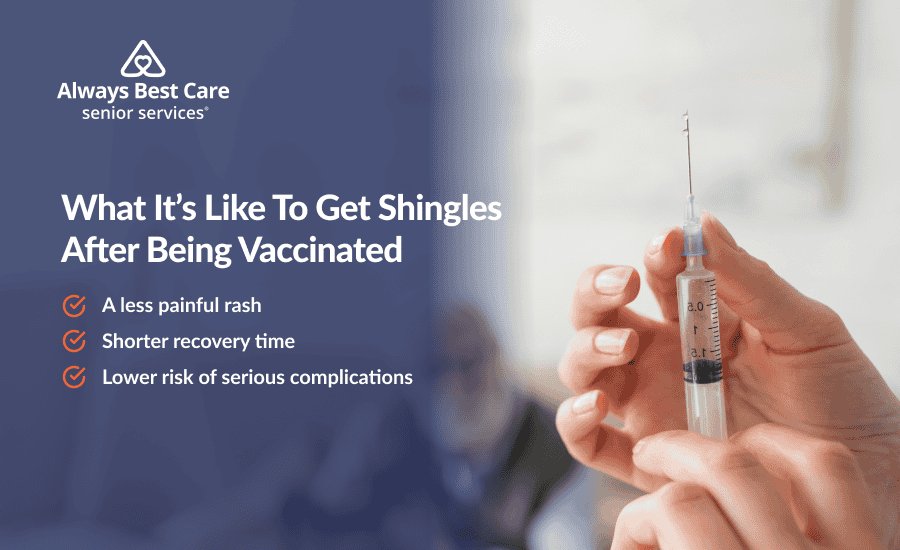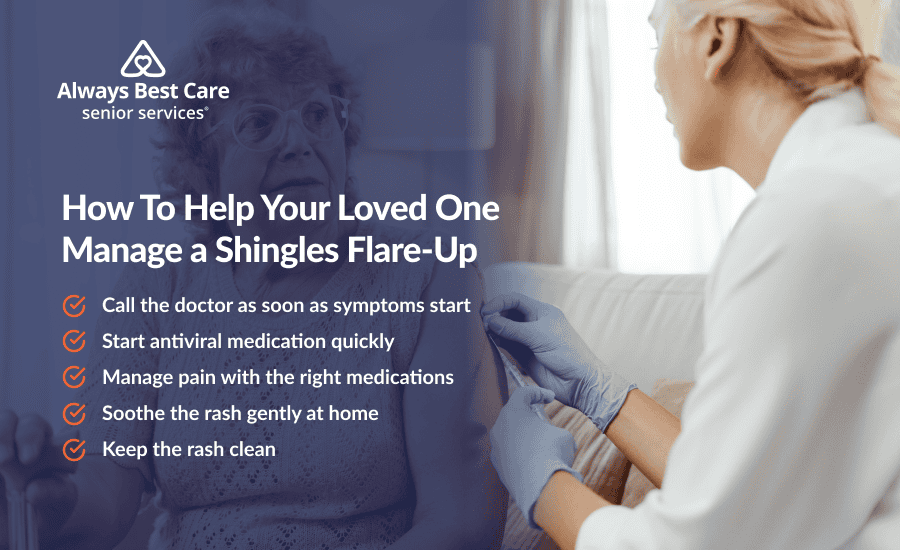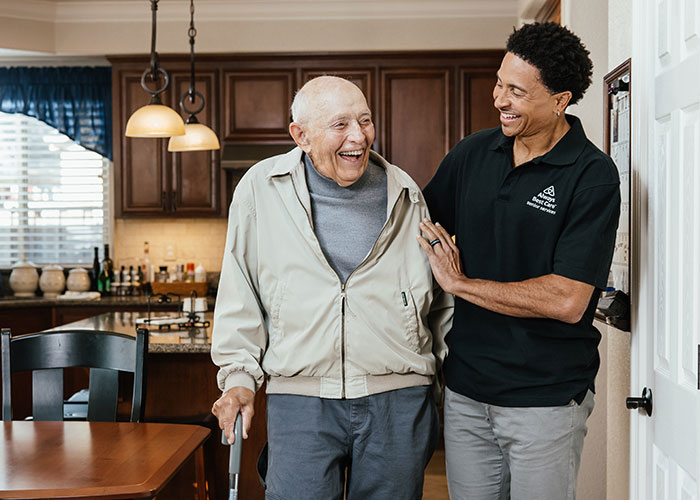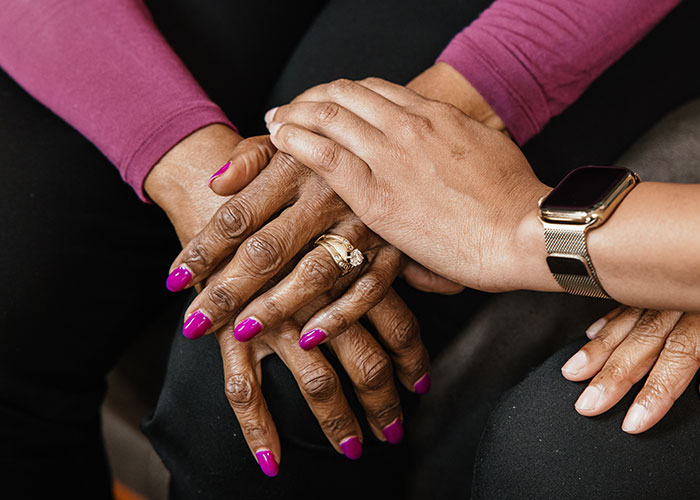Can You Get Shingles After Being Vaccinated? [Tips + FAQs]
![Can You Get Shingles After Being Vaccinated? [Tips + FAQs]](https://cdn.alwaysbestcare.com/wp-content/uploads/2025/10/can-you-get-shingles-after-being-vaccinated-hero-image.png)
Table of Contents
Can You Get Shingles After Being Vaccinated? Key Takeaways
- Yes, shingles can still occur after vaccination, but the risk is lower
- The shingles vaccine, called SHINGRIX, is over 90% effective
- If you contract shingles, the symptoms are usually milder, and the illness tends to resolve more quickly
If your loved one has been through shingles once, they know how painful and exhausting it can be.
Unfortunately, shingles isn’t always a one-time ordeal. It can come back, sometimes more than once.
Thankfully, getting vaccinated can significantly lower the chances of another outbreak and help manage side effects.
In the sections below, we will:
- Answer the question, “Can you get shingles after being vaccinated?”
- Clear up common myths about the shingles vaccine
- Explore why shingles can still happen after vaccination
- Cover what to expect if your loved one gets shingles post-vaccine
- Share how Always Best Care can support a smooth recovery at home
Shingles Vaccine: Debunking the Myths
Let’s bust a few myths so you know what the shingles vaccine does and doesn’t do.
1. Provides 100% Immunity
According to the Centers for Disease Control and Prevention (CDC), SHINGRIX is about 90% effective at preventing shingles in older adults.
While not foolproof, it significantly lowers the risk. And if the condition does occur, it’s usually milder, with fewer complications and a faster recovery.
2. Contains a Live Virus
The current shingles vaccine doesn’t contain a live virus.
Instead, it is a recombinant vaccine, which means it uses a small, harmless piece of the virus’s genetic code to train your immune system to recognize and fight the real thing.
It’s a safer choice for people with weakened immune systems because it doesn’t contain live virus and won’t cause illness in those with existing health conditions.
How Effective Is the Shingles Vaccine?
According to the CDC, the shingles vaccine is more than 90% effective at preventing shingles and the long-term nerve pain it can cause, known as postherpetic neuralgia (PHN).
It’s especially effective for adults aged 50 and up who have a healthy immune system.
What Happens If You Get Shingles After the Vaccine?
Many folks who get shingles after the vaccine experience:
- A less painful rash
- Shorter recovery time
- Lower risk of serious complications, like postherpetic neuralgia
In other words, even if you do get shingles, the vaccine helps your body respond more quickly and reduce the severity of symptoms.

The Shingles Virus Can Go Dormant Then Reactivate Later
Shingles is triggered by the same virus that causes chickenpox, called varicella-zoster.
After you’ve had chickenpox, the virus doesn’t leave your body. Instead, it settles into your nerve tissue and stays dormant.
As you get older or should your immune system weaken, the virus can reactivate, causing shingles. When this happens, it inflames the affected nerves and nearby skin, leading to burning or stabbing pain.
After several days, a blistering rash appears along the path of the nerve. The skin in that area might become extremely sensitive; even a light touch can be painful.
After the outbreak clears, the virus becomes dormant again in the body.
Understanding Recurrent Shingles
Recurrent shingles happens when someone gets shingles more than once. It is not common, but it can happen, especially in people with weakened immune systems.
A 2024 review found that about 1 in 10 people who’ve had shingles will experience it again.
Who’s Most at Risk for Recurrence After the Shingles Vaccine?
Even though the vaccine is over 90% effective, it’s not a guarantee. Some people, particularly those with weakened immune systems, may still get shingles, even after vaccination.
This can include:
- Adults with cancer, HIV, or other conditions that affect immune function
- People taking immunosuppressive medications (like chemotherapy or long-term steroids)
- Older adults over 70, whose immune response may be naturally lower
- Anyone who didn’t complete the full two-dose series
If your loved one falls into one of these groups, watch for early symptoms and talk to their doctor about whether additional precautions are needed.
What Can Cause Shingles To Come Back?
Shingles can come back when your immune system is weakened by illness, stress, or certain medications.
A few things that might raise your risk of a recurrence include:
- Re-exposure to the chickenpox virus
- Taking immune suppressing medications
- Having health conditions, like diabetes or HIV
- Living with cancer, especially leukemia or lymphoma
When your immune defenses are down, the virus has a better chance of reactivating. That’s why managing your overall health is such an important part of prevention.
What Does Recurrent Shingles Look Like?
Shingles usually shows up as a painful, blistering rash on one side of the body. It often forms a stripe that wraps around the back or chest, but seldom spreads to both sides.
The blisters typically scab over within 7 to 10 days, and the rash usually clears up within two to four weeks.
Before the Rash Appears
A few days before the rash, your loved one might feel:
- Tingling
- Itching
- Burning or stabbing pain
These early symptoms often occur in the area where the rash will develop.
If the Rash Is Near the Eyes
A rash on the face, especially near the eyes, might lead to vision problems or even permanent sight loss. Blisters on the nose can also be a warning sign that the virus is affecting the eye.
It’s a good idea to see a doctor promptly if the rash is near the eyes or on the face, since it could lead to complications if left untreated.
How To Help Your Loved One Through a Shingles Flare-Up
Managing shingles a second or even third time can feel overwhelming, but understanding what to expect and how to relieve symptoms can help make the experience easier for your elderly loved one.
1. Call the Doctor as Soon as Symptoms Start
If your loved one has signs of shingles, like tingling, pain, or a new rash, don’t wait. Early treatment is most effective within the first 72 hours.
A doctor can confirm the diagnosis and start antiviral medication right away.
2. Start Antiviral Medication Quickly
Antivirals can shorten the outbreak and ease symptoms, especially when taken early. Make sure your loved one completes the full course, even if they start to feel better.
3. Manage Pain With the Right Medications
Over-the-counter pain relievers like Tylenol can help.
If the pain is severe, ask the doctor whether a prescription medication might help. Managing pain early can improve comfort and help reduce stress for your loved one.
4. Soothe the Rash Gently at Home
Sometimes, the little things, like a cool cloth or an oatmeal bath, can offer surprising relief. These small comforts go a long way when trying to ease a loved one’s pain.
- Apply calamine lotion for itch relief
- Use cool, damp cloths to ease burning or tingling
- Offer oatmeal baths in lukewarm water to calm irritated skin
- Avoid hot water, which can make symptoms worse
5. Keep the Rash Clean and Covered
To prevent infection and protect others:
- Keep the rash dry and clean
- Cover it with a nonstick dressing
- Wash your hands after any contact with the rash or dressing
This helps lower the risk of a secondary infection and prevents spreading the virus to others in the home.

Getting the Shingles Vaccine: When Should You Call a Doctor?
If you’re starting to notice the first signs of shingles in your loved one, like tingling or pain, trust your instincts and call their doctor as soon as possible.
- Tingling, burning, or pain on one side of the body (especially before a rash appears)
- A new rash with blisters, especially if it’s near the eyes or face
- Worsening pain, fever, or symptoms that don’t improve
- Blisters spreading across multiple areas or not scabbing over
- Any vision changes, confusion, or weakness
Getting treatment early really makes a huge difference.
Starting antiviral medication within the first 72 hours can help shorten the outbreak, ease your loved one’s discomfort, and lower the risk of complications.
Support Your Loved One’s Shingles Recovery With Always Best Care Senior Services
Shingles can be tough on older adults, both physically and emotionally.
While we don’t give vaccines ourselves, our team at Always Best Care fully supports the critical role they play in preventing shingles and its uncomfortable side effects.
When your loved one’s not feeling like themselves, even making a sandwich or tidying up can feel like too much. That’s where we come in, with meals, errands, and a warm presence that feels like family.
Our team can help with:
- Preparing nutritious meals so your loved one stays nourished, hydrated, and well-fed, especially when they’re not feeling their best
- Gentle reminders for medications, whether it’s antivirals or pain relief, to help them stay on track with their treatment
- Light housekeeping and personal care, from tidying up to trimming toenails, so they can feel clean, comfortable, and at ease at home
- Running errands and offering rides to appointments, the pharmacy, or even a quick grocery run, whatever helps them feel more independent
- Companionship that feels like family, offering a listening ear and warm presence to ease loneliness and lift their spirits
Can You Get Shingles After Being Vaccinated? FAQs
Can you get shingles after being vaccinated?
Yes, it’s still possible to get shingles after being vaccinated, but it’s less likely. And if it does happen, it’s usually a milder case with a quicker recovery.
Do vaccines have harmful long-term side-effects?
No, vaccines are carefully tested and monitored to ensure they’re safe.
Before they’re approved, vaccines go through rigorous clinical trials. Even after they’re available to the public, health experts continue to monitor them for any safety concerns.
Some people may have mild, short-term side effects, like a sore arm, low-grade fever, fatigue, or a slight rash, but these usually go away within a few days.
Do you need a booster for the SHINGRIX vaccine?
A booster currently isn’t needed, but that could change as new research emerges about how long the protection lasts.
Can shingles be worse if your immune system is weak?
Yes, it can. When your immune system is not at full strength, shingles may hit harder. This means spreading more, lasting longer, and causing more discomfort.
It also raises the risk of complications, so it’s a good idea to check in with a doctor if you notice any signs of shingles.
Can stress trigger a shingles outbreak?
Yes, high stress levels can play a role in triggering a shingles outbreak, especially if you’ve had chickenpox before.
Stress doesn’t directly cause shingles, but it can weaken your immune system, making it harder for your body to keep the virus inactive.





